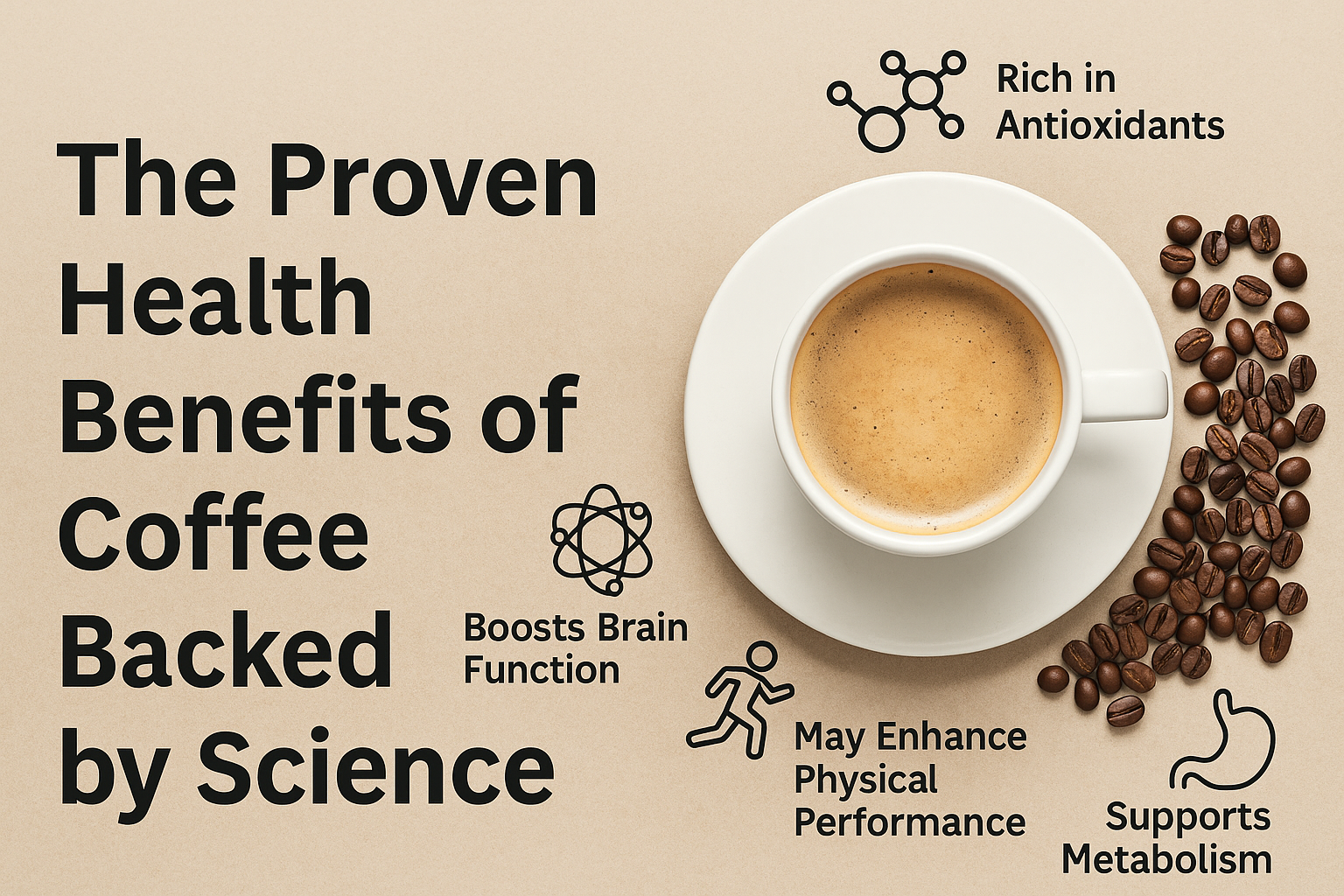For many people, coffee is more than just a morning ritual—it’s an essential part of daily life. Beyond its rich aroma and energizing effect, coffee has been the subject of extensive research over the years.
Studies have revealed that moderate coffee consumption is linked to a variety of health benefits, from improved brain function to a reduced risk of certain chronic diseases.
Understanding these scientifically backed benefits can help you enjoy your daily cup with even more appreciation.
1. Boosts Mental Alertness and Cognitive Function
One of coffee’s most well-known benefits comes from its caffeine content. Caffeine is a natural stimulant that blocks adenosine, a neurotransmitter that promotes drowsiness.
By doing so, it increases the levels of other neurotransmitters like dopamine and norepinephrine, which enhance brain activity. This leads to improved alertness, concentration, and reaction times.
Research also suggests that regular coffee drinkers may have a lower risk of neurodegenerative diseases such as Alzheimer’s and Parkinson’s, possibly due to caffeine’s protective effects on brain cells.
2. Enhances Physical Performance
Caffeine doesn’t just stimulate your brain—it also boosts your body’s performance. Studies have shown that caffeine increases adrenaline levels in the bloodstream, preparing the body for intense physical exertion.
It also helps break down body fat, making free fatty acids available as fuel. This combination improves endurance and physical output, which is why caffeine is a common ingredient in sports supplements.
Drinking a cup of coffee about 30 minutes before a workout can provide a noticeable performance boost.
3. Rich Source of Antioxidants
Coffee is one of the largest sources of antioxidants in the modern diet, surpassing even fruits and vegetables for many people. Antioxidants help neutralize free radicals in the body, reducing oxidative stress and inflammation.
Compounds like chlorogenic acid, found abundantly in coffee, may contribute to better heart health, improved blood sugar regulation, and reduced risk of certain cancers.
4. Supports Heart Health in Moderation
While excessive caffeine can increase heart rate and blood pressure in sensitive individuals, moderate coffee consumption has been associated with heart health benefits.
Large observational studies have found that drinking two to four cups of coffee per day is linked to a reduced risk of heart disease and stroke.
These benefits may be due to coffee’s anti-inflammatory and antioxidant properties, as well as its potential to improve endothelial function—the ability of blood vessels to expand and contract properly.
5. May Lower the Risk of Type 2 Diabetes
Multiple studies have shown that coffee drinkers have a lower risk of developing type 2 diabetes. Researchers believe this may be due to coffee’s ability to improve insulin sensitivity and support healthy blood sugar levels.
Both caffeinated and decaffeinated coffee have been linked to this benefit, suggesting that compounds other than caffeine—such as antioxidants and polyphenols—play a role.
6. Supports Liver Health
Your liver plays a vital role in detoxification, metabolism, and nutrient processing, and coffee may help protect it. Regular coffee consumption has been linked to a lower risk of liver conditions such as fatty liver disease, fibrosis, and cirrhosis.
Coffee also appears to lower liver enzyme levels, which is an indicator of better liver function. Studies have even found a reduced risk of liver cancer among coffee drinkers.
7. May Aid in Longevity
When you add up all of coffee’s potential benefits—from better heart and brain health to lower risks of chronic diseases—it’s no surprise that research has linked coffee consumption to a longer lifespan.
Large-scale studies involving hundreds of thousands of people have found that moderate coffee drinkers tend to live longer than non-drinkers.
This doesn’t mean coffee is a magic bullet, but it suggests that incorporating it into a balanced lifestyle can contribute to overall well-being.
8. Improves Mood and May Reduce Depression Risk
Caffeine stimulates the release of dopamine and serotonin—neurochemicals associated with mood regulation and happiness.
Several studies have linked regular coffee consumption to a reduced risk of depression, especially in women.
This mood-boosting effect may be due to caffeine’s impact on brain chemistry as well as the pleasurable experience of drinking coffee itself.
9. May Protect Against Certain Cancers
Research suggests that coffee may reduce the risk of certain cancers, including colorectal and liver cancer.
This protective effect is thought to be due to coffee’s antioxidants, anti-inflammatory compounds, and ability to promote healthy liver function.
While coffee should never replace regular cancer screenings or medical advice, it may serve as one small part of a cancer-preventive lifestyle.
How Much Coffee Is Healthy?
While coffee offers many benefits, moderation is key. For most healthy adults, consuming up to 400 milligrams of caffeine per day—roughly four 8-ounce cups of brewed coffee—is considered safe.
However, sensitivity to caffeine varies, and excessive intake can cause insomnia, jitteriness, or digestive discomfort.
Pregnant individuals, those with certain health conditions, and people sensitive to caffeine should consult with their healthcare provider about safe limits.
Final Thoughts
Coffee is more than just a drink—it’s a source of energy, antioxidants, and even disease protection. Science supports the idea that when consumed in moderation, coffee can be a valuable part of a healthy lifestyle.
From boosting brain power to supporting heart and liver health, its benefits are both broad and impressive.
The next time you enjoy your morning brew, you can feel good knowing that your coffee habit may be doing more for you than just waking you up.
